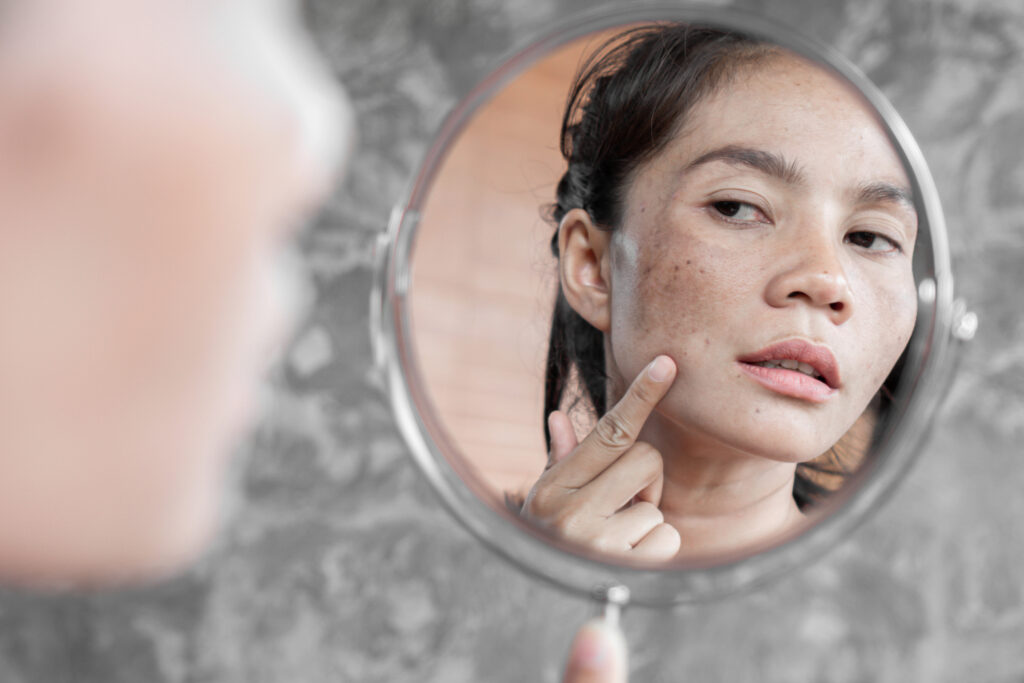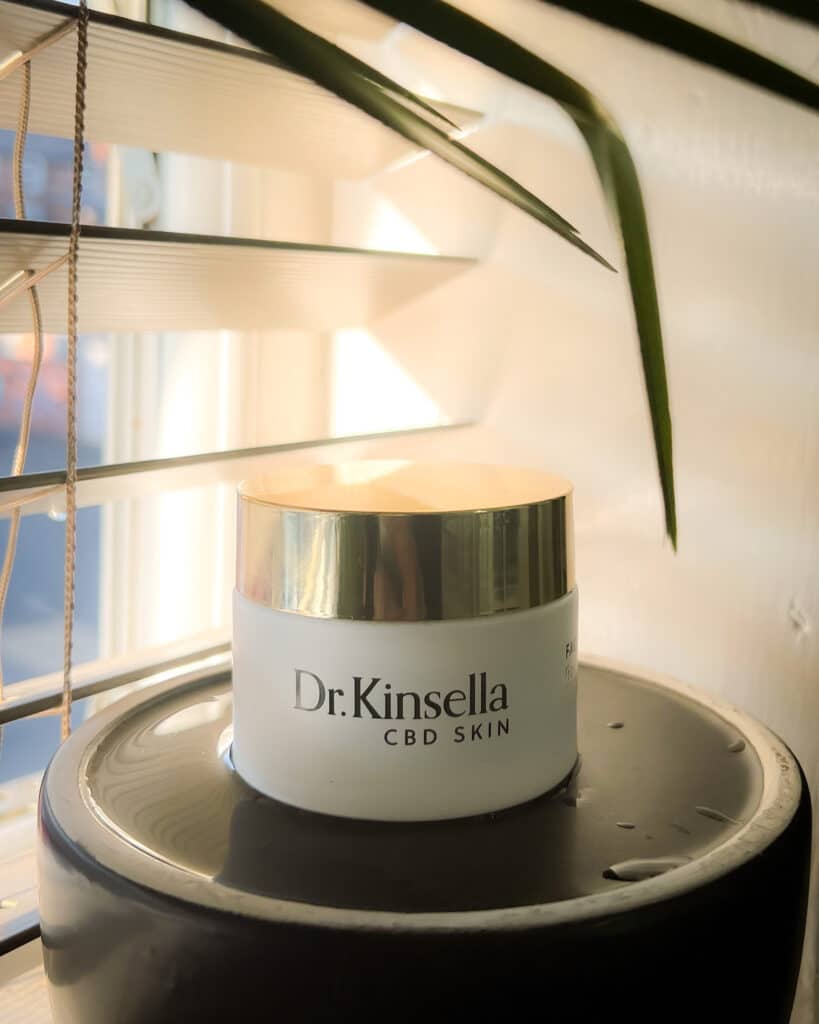GLOW OIL
FACE CREAM
EYE SERUM
Dark Spot Treatment: The Ultimate Guide
Key points
- Dark spots are a medical condition that develops when too much melanin is produced in our skin. It can occur due to different factors, including ageing, hormonal disbalance, prolonged sun exposure, and exposure to some medications. There are different treatments that can minimise hyperpigmentation.
- If you have hyperpigmentation, look for the following ingredients when selecting skincare products: vitamin C, hydroquinone, azelaic acid, kojic acid, and soy. These components slow down the production of melanin, which helps to target dark spots.
- Some of the most popular treatments for hyperpigmentation include chemical exfoliators, retinoids, creams and serums with hydroquinone, microdermabrasion, micro-needling, and laser treatments. All of these have their risks which you should consider before going through these procedures.
- The best way to deal with hyperpigmentation is to prevent it. Make sure to wear your sunscreen daily as well as avoid sun exposure during peak hours.
- Including skin care products with antioxidants like vitamin C and vitamin E in your routine may also be helpful. These vitamins fight free radicals and prevent premature ageing, which is the most common cause of hyperpigmentation.
Hyperpigmentation or dark spots is a relatively common skin condition caused by different factors, including acne scars, sun exposure, age, and hormonal changes.
We all strive to have a perfect and even skin complexion, and while most dark spots are harmless, many people still want to have flawless skin without unwanted pigmentation. While there are lots of over-the-counter skin care products that claim to be helpful with hyperpigmentation, not all of them provide the same effect. Read this article and discover what works best for hyperpigmentation and what ingredients you should look for when selecting your next cream or serum.

What Causes Dark Spots?
Dark spots occur when skin cells called melanocytes produce too much melanin – the pigment that gives the skin its colour. This overproduction of melanin can be explained by many factors. For instance, it often occurs due to hormonal changes, as both oestrogen and progesterone can increase the level of melanin in the body, which explains why pregnant women usually have dark spots on their skin.
Prolonged sun exposure, as well as ageing, can also contribute to this issue. Sometimes, dark spots appear because of skin irritation, which is known as post-inflammatory hyperpigmentation. It can occur as a result of acne, waxing, bites, cuts, burns, harsh skin care products, and scarring from different skin conditions.
What Ingredients Help With Hyperpigmentation?
There are several ingredients you can implement in your skincare routine to deal with this issue:
Vitamin C
Vitamin C is somewhat of a miracle elixir in the skincare world. It’s the best antioxidant that fights free radicals and prevents oxidative damage, which is one of the common causes of wrinkles and saggy skin. Plus, vitamin C inhibits enzymatic processes that produce melanin in the skin, meaning it can reduce skin hyperpigmentation. What makes vitamin C truly great is that it lightens up only problem areas of the skin and not all of it.
If you’re looking for products that will help you with hyperpigmentation, check out the premium eye serum and premium glow oil by Dr. Kinsella. Formulated with the best ingredients and lots of high-quality vitamin C, these products not only target dark spots but also give your skin a healthy glow, increase its firmness, and make it look more toned.
Hydroquinone
Hydroquinone is another popular ingredient for hyperpigmentation, along with antioxidants like vitamin C. It works by inhibiting the enzyme called tyrosinase, which catalyses melanin production. The less tyrosinase in your skin, the less melanin is produced. Depending on the extent of hyperpigmentation, you should be able to see positive results 2 – 4 months after starting treatment. Make sure to do a spot test before applying hydroquinone to your skin because it can cause an allergic reaction in some people.
Azelaic Acid
Azelaic acid is a less popular but very effective dark spot treatment. It’s extracted from oat, wheat, or rye, and it prevents abnormal pigmentation. It also has antibacterial properties, so it may help to get rid of acne and pimples. You can use azelaic acid alone or mix it with your moisturiser.
Kojic A
Kojic acid is derived from mushrooms or fermented rice and is commonly included in anti-pigmentation skin products. It’s also often combined with hydroquinone for maximum results. It works by blocking the UV-activation of tyrosinase, which slows down melanin production. Keep in mind that kojic acid may not be the best solution if you have sensitive skin. It’s more irritating than hydroquinone and may trigger allergies and contact dermatitis, which is why it’s used in low concentrations. Kojic acid is not as fast as other treatments, so don’t expect visible results right away.
Soy
Soy extract derived from soybean plants has also shown skin-brightening properties. Soy prevents melanin from entering the top layer of skin, which is why it’s often included in different skin-lightening products.
Skin Pigmentation Treatments
Hydroquinone Creams And Serums
Skincare products with hydroquinone are the most popular solution for targeting dark spots. However, it’s available only in low concentrations because it may be harmful when used in higher doses. There are some concerns that it may cause cancer, but more research is needed. If you decide to use products containing hydroquinone, it’s recommended to use them short-term and stop immediately if you experience irritation or any other side effects.
We recommend sticking with safe products that contain antioxidants such as vitamin C, vitamin E, and natural oils, such as products by the Dr. Kinsella brand. They are natural and safe and don’t cause any side effects.

Chemical Exfoliators
Chemical exfoliators use different acids to increase skin turnover and remove the top layer of the skin. The outer layer consists of dead cells, so removing it will bring up healthier and revitalised skin. Some common ingredients for chemical exfoliating products are alpha hydroxy acid (AHA), azelaic acid, beta-hydroxy acid (BHA), glycolic acid, lactic acid, mandelic acid, and salicylic acid. After each application, your skin needs time to repair, so don’t use these products too often if you don’t want to experience irritation or inflammation.
Retinoids
Products with retinoic acid are meant to increase cell turnover and act like exfoliators. Retinoids are derivatives of vitamin A and researchers have found that retinoids use may improve dark spots. However, constant use of retinoids can cause dry skin and make it more prone to UV light. Also, it takes a few months or even longer for this treatment to work, so don’t expect quick results.
Microdermabrasion
Microdermabrasion is another type of exfoliating treatment that targets hyperpigmentation. It works by using tiny particles to remove dead skin. This procedure is non-chemical and does not require significant recovery time. It works best for mild hyperpigmentation and provides rather modest results.
Microneedling
Microneedling is often paired with topical treatments for hyperpigmentation. Microneedling opens the skin barrier, which allows for better penetration of active ingredients. Usually, dermatologists will also use a wound-healing serum during the procedure. However, there’s always a risk of potential scarring from micro-needling treatments.
Laser Treatments
The most aggressive option for getting rid of dark spots is laser treatment. Some laser treatments target the problem spot itself, while others work by exfoliating the skin. Lasers generally work by burning off the darkened layers of the skin. While these procedures provide instant results, unlike topical treatments, they come with more risks as well. Some of them include swelling, infection, redness, scarring, tightness, and changes in the skin texture.
People with dark skin complexion also have to be very careful when using anti-hyperpigmentation treatments. Excessive use or use of the wrong products can lighten other skin areas.
How To Prevent Dark Spots
While all of the above treatments provide some effect, the risks they come with are much greater. That’s why instead of dealing with the issue itself, it’s important to do everything possible to prevent it.
If you notice dark spots on your skin, try to protect it to prevent the condition from becoming even worse. Make sure to always apply sunscreen because even low levels of UV light can add up and cause dark spots. Also, try to stay away from the sun during peak hours. Products that contain sun-blocking ingredients like zinc oxide and titanium dioxide may be helpful as well. They are also recommended to use after all hyperpigmentation treatments. But if you want true sun protection, use a broad-spectrum sunscreen (at least SPF 30) and reapply it every two hours or so.
Keep in mind that some medications may worsen or provoke hyperpigmentation. If you’re on any type of prescribed medication, check the labels to find out whether it causes dark spots or not.
Some skincare products, such as those containing retinoids or acids, make your skin more sensitive and prone to developing dark spots. So if you use these products, you should always apply sunscreen before going outside, even on cloudy days.
Sometimes, hyperpigmentation occurs as a result of natural ageing. In this case, try to start using products that target small wrinkles, fine lines, and dark spots before they become worse. Premium skin care products by Dr. Kinsella contain a variety of rich ingredients that target premature ageing and help to make your skin flawless and glowing.
Hyperpigmentation Treatments You Should Avoid
While the treatments above come with their own risks, there’s a separate list of hyperpigmentation treatments you should avoid at all costs. One of them is bleach. The American Academy of Dermatology warns that using liquid bleach on the skin can result in serious burns.
Some anti-pigmentation skincare products contain dangerous ingredients which are often not listed on the ingredient list. One example is steroids. A lot of skin-lightening products also contain mercury, which is extremely dangerous. It can be found in products that contain hydroquinone and is often hidden under the following names: mercuric, quicksilver, calomel, cinnabaris, and hydrargyri oxidum rubrum.
FAQs
What causes face black spots?
Dark spots or hyperpigmentation are often caused by acne scars, excessive UV light exposure, hormonal changes, ageing, and some medications. There are a lot of topical and in-office treatments available for targeting these problem areas.
Do dark spots go away?
While most types of dark spots will go away on their own, it may take some time. That’s why many people with hyperpigmentation look for topical or in-office treatments. You can also look for the following ingredients in skincare to reduce dark spots: vitamin C, hydroquinone, azelaic acid, kojic acid, and soy.
What is the best treatment for dark spots?
All in-office or topical treatments come with risks that you should consider. Some of them cause irritation, redness, and inflammation or trigger allergic reactions. Some of the most popular hyperpigmentation treatments include chemical exfoliators, retinoids, creams and serums with hydroquinone, microdermabrasion, micro-needling, and laser treatments.
How can I remove dark spots permanently?
If you want to permanently remove dark spots, you may need to use in-office treatments such as laser, chemical peels, microdermabrasion, and micro-needling. A safer option is to try skin care products that contain antioxidants like vitamins C and E.
